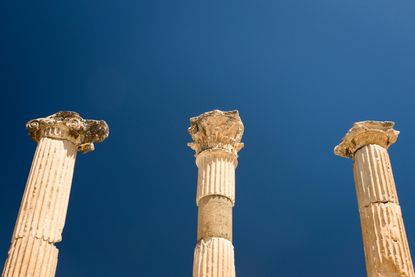An ominous prophecy for liberalism
Can liberalism survive?


In this American moment of political, cultural, and economic turbulence and anxiety, we do not lack for explanations of the cause. Rising inequality, persistent racism and xenophobia, technologically fueled ideological polarization — these and many other theories can be found in a slew of opinion columns, essays, academic studies, and books.
There's some truth in most of them, no doubt. But none of them can match the power of the breathtakingly radical explanation contained in Patrick Deneen's Why Liberalism Failed, which is probably why the just-published book has already received so much attention in the pages of The New York Times. It's the most electrifying book of cultural criticism published in some time, and it's hard to imagine its radicalism being surpassed anytime soon.
As his provocative title indicates, Deneen traces most of our current problems to a single cause: the failure of "liberalism." He doesn't mean the "neoliberalism" that has dominated the Democratic Party since the early 1990s and that has been the obsessive target of the socialist left ever since. Neither is he (merely) talking about the broader liberalism of the Democratic Party since the New Deal. He means the liberalism of our form of government as such — the norms, practices, and beliefs affirmed by both of our major political parties and nearly all American citizens.
Subscribe to The Week
Escape your echo chamber. Get the facts behind the news, plus analysis from multiple perspectives.

Sign up for The Week's Free Newsletters
From our morning news briefing to a weekly Good News Newsletter, get the best of The Week delivered directly to your inbox.
From our morning news briefing to a weekly Good News Newsletter, get the best of The Week delivered directly to your inbox.
But even that isn't radical enough to capture his claim in its full scope. Deneen is ultimately referring not just to the liberalism of our form of government but also and more fundamentally to the philosophical liberalism of the entire modern project stretching back two or more centuries before the American founding, to the writings of such authors as Machiavelli, Bacon, Descartes, Hobbes, and Locke — the men who first proposed that science and technology could be directed toward the end of transforming the world for the sake of liberating humanity from ignorance, fear, poverty, and political and religious oppression.
On one level, things have worked out much as these founders of liberal modernity intended them to. Their vision of the world shapes American politics and culture from top to bottom. Yet human beings are not flourishing in the world that liberalism has created. The reason why is found in the central paradox in a book that's full of them. Liberalism "has failed," Deneen writes, "because it has succeeded."
As liberalism has "become more fully itself," as its inner logic has become more evident and its self-contradictions manifest, it has generated pathologies that are at once deformations of its claims yet realizations of liberal ideology. A political philosophy that was launched to foster greater equality, defend a pluralist tapestry of different cultures and beliefs, protect human dignity, and, of course, expand liberty, in practice generates titanic inequality, enforces uniformity and homogeneity, fosters material and spiritual degradation, and undermines freedom. [Why Liberalism Failed]
This sweeping analysis builds on suggestions found in a range of writers: Leo Strauss, Alexis de Tocqueville, Christopher Lasch, and Wendell Berry, among others. What's unique is Deneen's synthesis of these authors' ideas and sweeping application of them to the distinctive problems of today.
That points to another paradox: A book that identifies a 500-year-long build-up to the supposed crisis of the present would have felt inapt at any prior moment in the unfolding process. During the Clinton administration, or the era of Ronald Reagan, or JFK, or FDR, let alone further back in time, Deneen's account of the "inner logic" of liberal modernity would have seemed bizarre if not entirely incomprehensible. But not now. In this respect, at least, the book has more in common with Hegelian or Marxist philosophies of history, in which the author invariably situates himself at the decisive moment in history when its true contours reveal themselves in an almost prophetic way, than it does with the comparatively microscopic cultural criticism that typically commands our attention.
Nowhere is Deneen's analysis more cogent than in his pox-on-both-their-houses account of America's noisily clashing political parties, neither of which can get to the root of our problems because both of them affirm a version the same liberalism. Each champions a somewhat different form of individual liberty and advocates a somewhat different kind of overweening state activity. Democrats combine morally anarchic cultural libertarianism with centralized government regulation of the economic and social spheres (the latter through the medium of anti-discrimination law), while Republicans combine a defense of communally based social constraints with a valorization of economic individualism that shreds those very constraints.
As far as Deneen is concerned, these superficial conflicts mask "the true relation between the state and the market: that they grow constantly and necessarily together. Statism enables individualism, individualism demands statism." That's because "our deepest philosophic premises" demand nothing less than constant liberation from externally imposed limits (whether rooted in nature, tradition, or God) and then the creation of substitute constraints in the man-made form of what Tocqueville called the "immense and tutelary power" of the state. The result is a near-fatal "degradation of citizenship" and consequent sense of powerlessness on the part of ordinary Americans.
The question that haunts Deneen's book, and that should haunt his readers when they put it down, is whether our vaguely felt but nonetheless pervasive malaise is a sign that America (and indeed the liberal world of the West as a whole) might be "approaching the end of the natural cycle of corruption and decay that limits the lifespan of all human creations."
That we may well be nearing an end — one after which Americans might begin to "imagine, and build, liberty after liberalism" — is Deneen's rather shocking suggestion.
It's not a suggestion I find especially persuasive. For one thing, Deneen's pitch-dark pessimism about the present seems overstated. Steven Pinker's data-driven optimism may go too far in the opposite direction, yet the fact remains that whether we're talking about rates of literacy, poverty, disease, or incidents of war, life under liberalism appears to be considerably less hellish than Deneen's rhetoric would have us believe. That doesn't mean that the anomie from which so many of our discontented fellow citizens apparently suffer is illusory. But it might mean that it has other and more complicated sources than the supposed inner logic of liberalism.
And that raises a more fundamental objection to Deneen's argument.
The claim that so many of our problems have their sources in the 16th and 17th centuries only appears compelling when one accepts the assertion that liberal modernity is an intentional project set in motion by a handful of philosophers. It's truer to the historical record to conclude that the lineaments of the modern world emerged via complex social and economic processes over which no one mind or group of thinkers exercised decisive control and to which liberal politics was primarily a response. Liberalism was a rescue operation for European life largely devised after it had already been torn asunder by religious war and destabilized by unprecedented economic dynamism and scientific discoveries, both of which undermined the authority of various received traditions and institutions.
Viewed in this light, many of the pernicious ideas and trends that Deneen so potently and justifiably skewers in his book appear not to be synonymous with "liberalism" so much as examples of ideologies that have emerged from within the liberal order as it struggles to contend with both longstanding and newly emerging challenges. (Libertarianism and progressivism are two such ideologies.)
This might sound like a distinction without a difference, but it's a crucially important one, since it leaves open the possibility that our problems have more proximal sources than Deneen will allow, and that these problems do not quite portend the world-historical failure of liberalism. Sometimes bad ideas lose their power without taking everything down with them.
I suspect that's somewhat closer to the fate that awaits us than Patrick Deneen's much more ominous contrary suggestion. But I could be wrong. Which is why it's so important that people read and wrestle with Deneen's important and deeply disconcerting book.
Sign up for Today's Best Articles in your inbox
A free daily email with the biggest news stories of the day – and the best features from TheWeek.com
Damon Linker is a senior correspondent at TheWeek.com. He is also a former contributing editor at The New Republic and the author of The Theocons and The Religious Test.
-
 Today's political cartoons - December 21, 2024
Today's political cartoons - December 21, 2024Cartoons Saturday's cartoons - losing it, pedal to the metal, and more
By The Week US Published
-
 Three fun, festive activities to make the magic happen this Christmas Day
Three fun, festive activities to make the magic happen this Christmas DayInspire your children to help set the table, stage a pantomime and write thank-you letters this Christmas!
By The Week Junior Published
-
 The best books of 2024 to give this Christmas
The best books of 2024 to give this ChristmasThe Week Recommends From Percival Everett to Rachel Clarke these are the critics' favourite books from 2024
By The Week UK Published
-
 US election: who the billionaires are backing
US election: who the billionaires are backingThe Explainer More have endorsed Kamala Harris than Donald Trump, but among the 'ultra-rich' the split is more even
By Harriet Marsden, The Week UK Published
-
 US election: where things stand with one week to go
US election: where things stand with one week to goThe Explainer Harris' lead in the polls has been narrowing in Trump's favour, but her campaign remains 'cautiously optimistic'
By Harriet Marsden, The Week UK Published
-
 Is Trump okay?
Is Trump okay?Today's Big Question Former president's mental fitness and alleged cognitive decline firmly back in the spotlight after 'bizarre' town hall event
By Harriet Marsden, The Week UK Published
-
 The life and times of Kamala Harris
The life and times of Kamala HarrisThe Explainer The vice-president is narrowly leading the race to become the next US president. How did she get to where she is now?
By The Week UK Published
-
 Will 'weirdly civil' VP debate move dial in US election?
Will 'weirdly civil' VP debate move dial in US election?Today's Big Question 'Diametrically opposed' candidates showed 'a lot of commonality' on some issues, but offered competing visions for America's future and democracy
By Harriet Marsden, The Week UK Published
-
 1 of 6 'Trump Train' drivers liable in Biden bus blockade
1 of 6 'Trump Train' drivers liable in Biden bus blockadeSpeed Read Only one of the accused was found liable in the case concerning the deliberate slowing of a 2020 Biden campaign bus
By Peter Weber, The Week US Published
-
 How could J.D. Vance impact the special relationship?
How could J.D. Vance impact the special relationship?Today's Big Question Trump's hawkish pick for VP said UK is the first 'truly Islamist country' with a nuclear weapon
By Harriet Marsden, The Week UK Published
-
 Biden, Trump urge calm after assassination attempt
Biden, Trump urge calm after assassination attemptSpeed Reads A 20-year-old gunman grazed Trump's ear and fatally shot a rally attendee on Saturday
By Peter Weber, The Week US Published